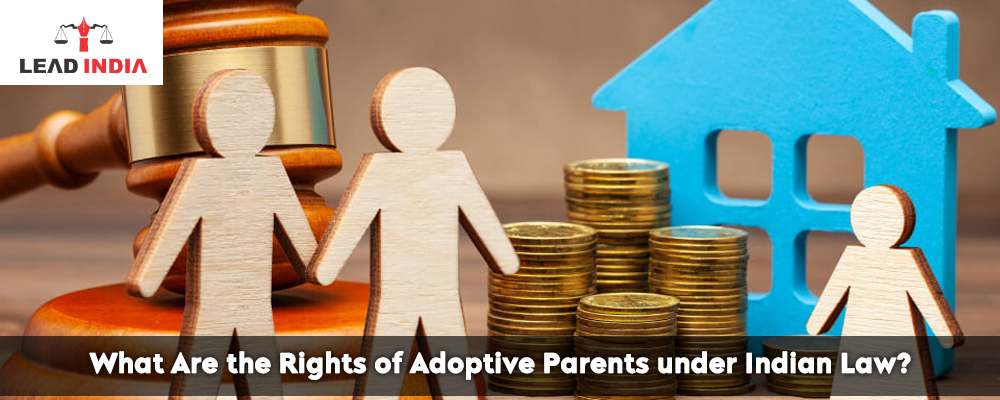Adoption is the legal procedure in which an adopted child becomes the legal child of his adoptive parents. All the rights and liabilities are the same as those of their biological child. The ties of an adoptive child with the biological family are broken. All the social, legal, and kinship benefits of a biological child are given to the adoptive child.
Adoption in India is still considered a sacramental act. Under the old Hindu law, there were various laws governing adoption that could only be justified by the fact that adoption constituted a sacramental act. The Hindu Adoption and Maintenance Act of 1956 clearly emphasized the religious and sacramental aspects of adoption, transforming it into a secular institution.
Laws Related to Adoption in India
- Hindu Adoption and Maintenance Act: In this Act, Hindus, Buddhists, Jains, and Sikhs can adopt a child. There is a concept of dattaka hom ceremony that is sufficient to obtain irrevocable adoption rights. The Act laid down the requirements for legitimate adoption, which include that the person adopting should have the capacity and right to adopt, and the person who is giving in adoption should also have the capacity to do so. The person adopted should also be capable of being taken in adoption.
It even talks about the rights of Hindu men and women to take part in adoption. A Hindu male of sound mind can adopt a child regardless of his being a bachelor, widower, divorcee, or married person. For a married Hindu male, gaining his wife’s approval is require. If he has more than one partner, both wives must consent. Similarly, a Hindu single woman, divorcee, or widow has the right to adopt a child under this Act.
- Juvenile Justice Act: This Act also provides the procedure for adoption. In this, the person has to apply to CARA, after which a specialized adoption agency will prepare a home study report. If the agency is satisfy, it will refer a child declare legally free for adoption to the applicant. In this, a couple and a single parent can adopt a child. The adoptive parent should be mentally and physically fit; in the case of a couple, the consent of the spouse is require. A single male cannot adopt a girl child, and the minimum age difference should not be less than twenty-five years.
Need A Legal Advice
The internet is not a lawyer and neither are you. Talk to a real lawyer about your legal issue

Rights of Adoptive Parents under Indian Law
The moment the adoption process has been complete and the DM has pass an order of adoption, the adoptive parents have the same rights as those of biological parents. They become the legal guardians of their children.
They can make choices and make decisions for their child. The adoptive parents have the right to retain and dispose of their property as they wish. Adoption does not affect the disposal of property. They can transfer their property without any restriction.
Major challenges related to adoption in India
- The procedure of adoption in India is a lengthy procedure. It leads to delays in the placement of children with prospective families. The CARA report shows that while more than 30,000 prospective parents are already waiting to adopt a child, less than 7% of the children, which is 2131, are legally available for adoption.
- We are also facing the problem of returning a child after adoption. In 2020, CARA reported that over 1,100 children adopt throughout the country had been return to childcare institutions by their adoptive parents in the previous five years.
Case Laws
- In the case of Teesta Chattoraj v. Union of India (2012), the parents separated by mutual consent, and the father gave up all his responsibilities towards his daughter. The mother, after remarriage through the adoption deed, gave the daughter to a second husband without the permission of the biological father. The appeal was denied when the child filed for a passport using the stepfather’s name as the father since the adoption was void. As a result, under Article 226 of the Constitution, the child can file a petition through her mother. The court held that a stubborn parent might have abdicated all commitments to the child yet wanted permission out of pure vindictiveness, resulting in psychological, mental, social, and practical issues as well as humiliation for the children.
- In the case of Ghisalal v. Dhapubai (2011, in this case, Gopalji adopted Ghisalal. A registered deed of adoption was also execute. The adoption ceremony includes customary procedures such as applying tilak to Ghisalal’s forehead and distributing sweets. Gopalji executed three gift deeds in favor of his wife, Dhapubai. Dhapubai sold a portion of land in survey No. 945 of village Kuchrod to Sunderbai through a sale deed. However, Gopalji later denied having adopted Ghisalal, claiming that no adoption ceremony was perform. Dhapubai also denied the adoption, asserting that she had not consented to it. The court upheld the validity of the adoption of Ghisalal by Gopalji. The court stated that the presence of Dhapubai at the adoption ceremony constituted the implied consent. Ghisalal, then, became a co-owner in Gopalji’s household and was entitle to a part of the properties.
For any legal help, contact Lead India. We offer free online legal consultation as well as other legal services. On our platform, you can talk to lawyers. You can freely ask any legal question. We provide the solutions to your legal problems.





 Talk to a Lawyer
Talk to a Lawyer